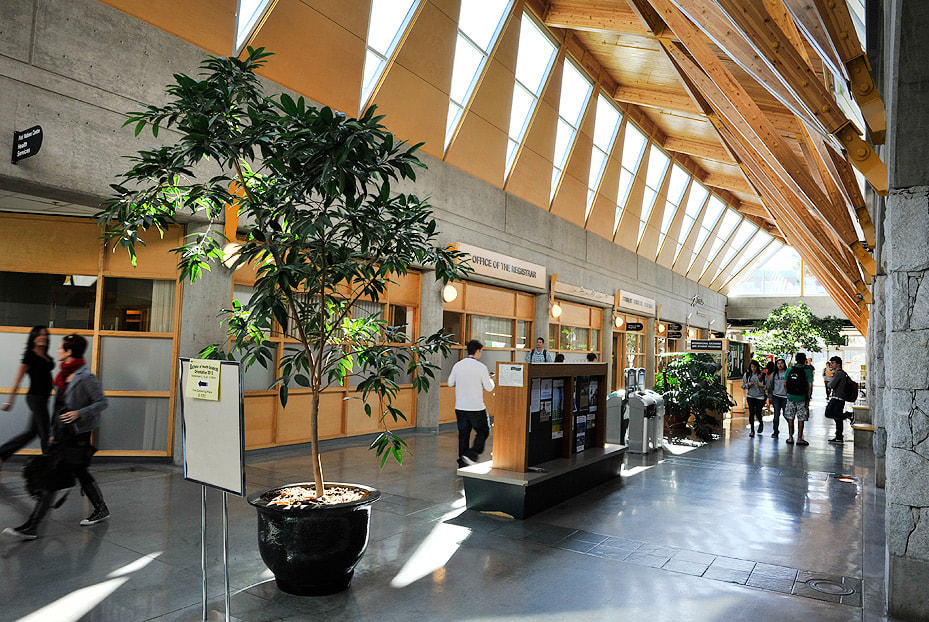โปรแกรม International Studies Graduate Program
สถาบัน University of Northern British Columbia
About UNBC
University of Northern British Columbia (UNBC) เป็นมหาวิทยาลัยของรัฐตั้งอยู่ที่เมือง Prince George รัฐ British Columbia โดย UNBC ถือเป็นมหาวิทยาลัยชั้นนำที่ดีที่สุดแห่งหนึ่งของรัฐบริติชโคลัมเบีย โดยเปิดสอนโปรแกรมหลากหลายระดับ Certificates, Diplomas, Bachelors, Masters และ Doctoral degrees และในฐานะที่เป็นหนึ่งในมหาวิทยาลัยที่มุ่งเน้นในด้านการวิจัยของ BC สถาบันได้นำความรู้ใหม่ ๆ ทันต่อเหตุการณ์ ให้แก่นักเรียนทุกคน รวมทั้งผลการเรียนการสอน และงานวิจัยทั่วโลก นอกจากนี้ UNBC ยังเป็นสถานที่ที่น่าอยู่ ด้วยสภาพแวดล้อมที่เป็นมิตร เหมาะแก่การเรียนรู้
Why study at UNBC?
- ทีมอาจารย์มีความรู้และทรงคุณวุฒิในหลากหลายสาขา
- โปรแกรมที่เปิดสอนอันหลากหลายที่โดดเด่นจากสถาบันอื่น ๆ Field studies and adventures
- ห้องเรียนขนาดไม่ใหญ่จนเกินไป Small class sizes
- การเรียนที่เน้นภาคปฏิบัติ Experiential approach to education
- การเรียนรู้นอกห้องเรียน จากสิ่งแวดล้อมและธรรมชาติ
- นักเรียนในมหาวิทยาลัย active มีโอกาสให้เราได้ร่วมกิจกรรมมากมาย
- การทำ Applied class projects ช่วยให้นำความรู้มาใช้ได้จริง
About International Studies Graduate Program
The Master's degree in International Studies typically takes two years to complete and is designed for students who wish to develop knowledge and skills beyond mere coursework. You will undertake independent research in your area of interest and can choose to write a thesis or a project paper. A major advantage of the thesis/project option is that you complete our program with deep expertise in a subject and well-honed analytical, research, writing, and communication skills. You will be well prepared to pursue international careers in today’s complex and knowledge-driven economy.
Thesis Option
Students choosing this option normally take 4 graduate-level courses in their first year and write the thesis during their second year of studies. The length of a thesis is normally around 100 pages. A thesis is expected to demonstrate scholarship appropriate to the graduate level and to make an intellectual contribution to the field of study.
Here are our 10 most recently defended theses:
- What is the Prospect for China-Africa Free Trade Agreements
- Exploring Adaption and Resilience to Drought: A Study of Brazilian Family Farmers
- The Absence of Gender in Canadian Foreign Policy: Canadian Policies Toward South Africa
- Gendered Violence in Gender-Based Development Projects: Conditional Cash Transfer Programs and Women’s ‘Empowerment’ and ‘Development’ in Bangladesh
- Representations of Security and Insecurity in the Highway of Tears: A Critical Discourse Analysis
- Framing Environment Crises: Correlating Action to Outcomes for the 1969 Santa Barbara and 2010 Deep-Water Horizon Oil Spills
- Partnerships and Value Chains for Lignin-Based Biorefineries – A Case Study Approach
- The War on Crime: the Securitization of Narco-Trafficking in Mexico During the Calderón Administration
- Canada’s Position on Corporate Social Responsibility in a Developing Country Context
- Quantitative Analysis of Indirect Drivers of Environmental Change in International River Basins
Project Option
Students pursuing a project normally take 5 graduate-level courses in their first year and write a Project paper in their second year. The length of a project paper is normally in the range of 40 to 60 pages. The Project paper is expected to focus on a policy problem and make recommendations for governments, organizations and/or individuals.
Here are our 10 most recently defended project papers:
- Exploring Group Health Insurance for Students in Canadian Post-Secondary Institutions
- The Role of Local Governments and Transnational Networks in Addressing Climate Change
- Is Resource Extraction a Curse or a Bonanza for Local Communities? Mining Case Study: Quiruvilca, Peru
- Looking Deeper into Security in the Arctic Policy of the Canadian Government from 2006 to 2011
- RMB Internationalization: How Far Has It Gone and What Should China Do?
- Oil, Environment and Insecurity: A Case Study of Oil Production-Related Environmental Insecurity in Nigeria’s Niger Delta Region
- Steps to Sustainable Forestry Success: a Case Study Analysis of Community-Based Forest Management in Developing Countries.
- Child Slavery and Corruption in West Africa
- Samuel Huntington’s Clash of Civilizations Hypothesis: Challenges from Amartya Sen and the Western South Asian Post-Immigrant Experience|
- The Struggle to Create a Market Economy in Russia
Steams and Coursework
Students can choose among 3 main streams for their degree: International Development, Global Environmental Policy, and Regional Relations. Each stream has different coursework requirements.
International Development
The International Development stream provides students with an understanding of the global forces and state and non-state actors affecting the economies and societies of developing countries, of the dimensions of human well-being and the strategies for their improvement at the national and community levels, and of the theoretical and practical tools used in applied development policy analysis and programming.
Global Environmental Policy
The Global Environmental Policy stream provides students with an understanding of the problems, policies, and institutional arrangements related to managing transboundary, regional, and global ecological problems such as climate change, natural resource competition in the Arctic and globally, and harmonization of environmental sustainability and economic development in the Global South and North.
Regional Relations
The Regional Relations stream provides students with an understanding of broad range of regional and sub-regional issues such as trade, finance, security, migration, human rights, and indigenous peoples. Our program has particular expertise in the Asia-Pacific region, the Americas, and the Circumpolar North and Russia. Also included in this stream are Canada's foreign economic and political relations and the work of international/regional organizations such as the United Nations (UN), World Bank and World Trade Organization (WTO).
Courses:
Thesis Option
Students choosing this option normally take 4 graduate-level courses in their first year and write the thesis during their second year of studies. The length of a thesis is normally around 100 pages. A thesis is expected to demonstrate scholarship appropriate to the graduate level and to make an intellectual contribution to the field of study.
Here are our 10 most recently defended theses:
- What is the Prospect for China-Africa Free Trade Agreements
- Exploring Adaption and Resilience to Drought: A Study of Brazilian Family Farmers
- The Absence of Gender in Canadian Foreign Policy: Canadian Policies Toward South Africa
- Gendered Violence in Gender-Based Development Projects: Conditional Cash Transfer Programs and Women’s ‘Empowerment’ and ‘Development’ in Bangladesh
- Representations of Security and Insecurity in the Highway of Tears: A Critical Discourse Analysis
- Framing Environment Crises: Correlating Action to Outcomes for the 1969 Santa Barbara and 2010 Deep-Water Horizon Oil Spills
- Partnerships and Value Chains for Lignin-Based Biorefineries – A Case Study Approach
- The War on Crime: the Securitization of Narco-Trafficking in Mexico During the Calderón Administration
- Canada’s Position on Corporate Social Responsibility in a Developing Country Context
- Quantitative Analysis of Indirect Drivers of Environmental Change in International River Basins
Project Option
Students pursuing a project normally take 5 graduate-level courses in their first year and write a Project paper in their second year. The length of a project paper is normally in the range of 40 to 60 pages. The Project paper is expected to focus on a policy problem and make recommendations for governments, organizations and/or individuals.
Here are our 10 most recently defended project papers:
- Exploring Group Health Insurance for Students in Canadian Post-Secondary Institutions
- The Role of Local Governments and Transnational Networks in Addressing Climate Change
- Is Resource Extraction a Curse or a Bonanza for Local Communities? Mining Case Study: Quiruvilca, Peru
- Looking Deeper into Security in the Arctic Policy of the Canadian Government from 2006 to 2011
- RMB Internationalization: How Far Has It Gone and What Should China Do?
- Oil, Environment and Insecurity: A Case Study of Oil Production-Related Environmental Insecurity in Nigeria’s Niger Delta Region
- Steps to Sustainable Forestry Success: a Case Study Analysis of Community-Based Forest Management in Developing Countries.
- Child Slavery and Corruption in West Africa
- Samuel Huntington’s Clash of Civilizations Hypothesis: Challenges from Amartya Sen and the Western South Asian Post-Immigrant Experience|
- The Struggle to Create a Market Economy in Russia
Steams and Coursework
Students can choose among 3 main streams for their degree: International Development, Global Environmental Policy, and Regional Relations. Each stream has different coursework requirements.
International Development
The International Development stream provides students with an understanding of the global forces and state and non-state actors affecting the economies and societies of developing countries, of the dimensions of human well-being and the strategies for their improvement at the national and community levels, and of the theoretical and practical tools used in applied development policy analysis and programming.
Global Environmental Policy
The Global Environmental Policy stream provides students with an understanding of the problems, policies, and institutional arrangements related to managing transboundary, regional, and global ecological problems such as climate change, natural resource competition in the Arctic and globally, and harmonization of environmental sustainability and economic development in the Global South and North.
Regional Relations
The Regional Relations stream provides students with an understanding of broad range of regional and sub-regional issues such as trade, finance, security, migration, human rights, and indigenous peoples. Our program has particular expertise in the Asia-Pacific region, the Americas, and the Circumpolar North and Russia. Also included in this stream are Canada's foreign economic and political relations and the work of international/regional organizations such as the United Nations (UN), World Bank and World Trade Organization (WTO).
Course Requirements
Whichever stream a student chooses, there is a requirement for (1) a theory course, (2) a methodology course, and (3) two or more subject-specific courses (see below). Students may also take courses relevant to their research offered by other Departments and through directed-reading courses.
International Development
- ECON 601-3 Global Economy and Development
- INTS 700-3 Research Methods OR
- ECON 611-3 Cost-Benefit Analysis OR
- ECON 604-3 Poverty, Inequality and Development
Global Environmental Policy
- INTS 701-3 State of the Discipline
- INTS 700-3 Research Methods
Regional Relations
- INTS 701-3 State of the Discipline
- INTS 700-3 Research Methods
Admission Requirements:
- TOEFL (Test of English as a Foreign Language) score of 90 or higher in the internet-based test, with not less than 20 in each of the Reading, Listening, Writing or Speaking components; Score of at least 230 in the computer based or at least 570 in the paper based test. UNBC’s institutional TOEFL code is 0320.
- IELTS (International English Language Testing System) Academic score of at least 6.5 overall, with not less than 6.0 in any of the four modules.
Contact Us
สนใจข้อมูลเพิ่มเติม สามารถสอบถามได้ที่ (085) 658-7000 (สาขากรุงเทพฯ) และ (778) 995-4763 (สาขาแวนคูเวอร์) ค่ะ


